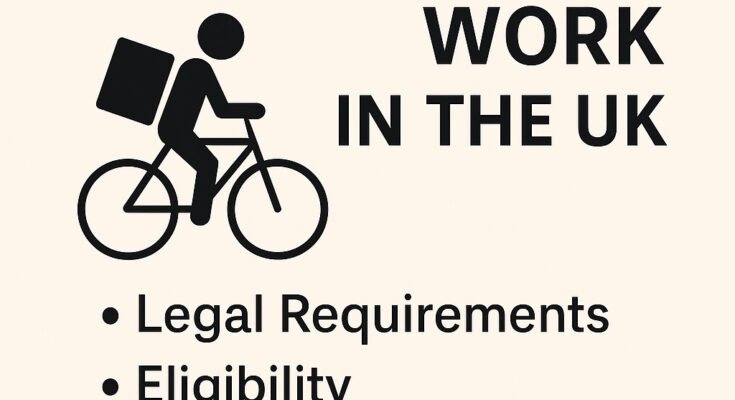With the rise of food delivery platforms like Uber Eats, Deliveroo, Just Eat, and others, food delivery work in the UK has become a popular income source for both locals and migrants. Whether you’re looking for a full-time gig, a side hustle, or flexible work to support your studies, delivering food can offer autonomy and competitive earnings.
However, before you hit the road with a thermal bag and your first delivery, it’s crucial to understand the legal requirements, who is eligible, and who cannot undertake this kind of work in the UK. This in-depth article covers everything you need to know to legally and successfully start food delivery work in the UK.
What is Food Delivery Work in the UK?
Food delivery work in the UK involves collecting prepared meals from restaurants or food outlets and delivering them to customers using a bicycle, scooter, or car. This work is typically coordinated through mobile apps provided by platforms like Deliveroo, Uber Eats, and Just Eat.
Most food delivery couriers are independent contractors, not employees. This gives you flexibility but also means you are responsible for your own taxes, insurance, and equipment.
Popular Food Delivery Platforms in the UK
If you’re planning to start food delivery work in the UK, your first step is to decide which platform(s) you want to work with. Here are the top options:
1. Deliveroo
- Offers flexible work via an app
- Pays per delivery plus potential bonuses
- Signup link: https://rider.deliveroo.co.uk
2. Uber Eats
- Partnered with McDonald’s, KFC, and more
- Weekly payments, incentives available
- Signup link: https://www.uber.com/gb/en/deliver/
3. Just Eat
- Now offers both employed and self-employed roles
- Available in most UK cities
- Signup link: https://couriers.just-eat.co.uk
Legal Requirements for Food Delivery Work in the UK
Before you begin food delivery work in the UK, you must meet several legal and administrative requirements:
1. Right to Work in the UK
You must have the legal right to work in the UK. This includes:
- UK citizens
- EU/EEA nationals with settled or pre-settled status
- Non-EU nationals with appropriate work visas (e.g., Skilled Worker visa, Graduate visa, Dependant visa)
You cannot legally work in the UK if you are:
- A tourist/visitor visa holder
- On a student visa without the right type of work permission
- An asylum seeker without a work permit
Check your right to work here: UK Government Work Rights Check
2. Age Requirements
You must be at least:
- 18 years old to work for Deliveroo, Uber Eats, or Just Eat
Some local councils may have higher age requirements for riding mopeds or motorcycles.
3. National Insurance Number
A National Insurance (NI) number is mandatory for legal employment or self-employment.
Apply here: Get a National Insurance Number
Vehicle Requirements
Depending on the platform and your location, you may use:
1. Bicycle
- Cheapest option
- Requires basic safety gear
- No insurance needed (except personal liability)
2. Scooter/Motorbike
- Must have valid UK driving license with CBT
- Vehicle must be taxed and MOT certified
- Delivery insurance required
3. Car
- Full UK driving license
- MOT, tax, and delivery insurance required
- You may need a private hire license in some boroughs (e.g., London)
Insurance Requirements
All motorised vehicle riders must have:
1. Hire and Reward Insurance
Standard car or bike insurance does not cover food delivery. You need:
- Specialist Hire & Reward insurance
- Monthly or annual policies available (e.g., Zego, Acorn, MCE)
2. Public Liability Insurance
Optional but recommended to cover accidents involving pedestrians or customers.
Who Can Do Food Delivery Work in the UK?
You can do food delivery work in the UK if you:
- Are over 18
- Have the legal right to work
- Own or lease a suitable vehicle (or bike)
- Have necessary insurance and documentation
- Register as self-employed with HMRC
- Hold a valid National Insurance number
International students with work permission on their visa can deliver food up to the allowed working hours (usually 20 hours per week during term time).
Who Cannot Do Food Delivery Work in the UK?
The following people are not eligible for food delivery work in the UK:
- Tourists or visitors (on short-term visas)
- Asylum seekers without work rights
- Undocumented migrants
- Underage individuals (below 18)
- Student visa holders exceeding permitted hours
- People without proper insurance or vehicle documentation
Working without permission is a criminal offense and can lead to visa cancellation or deportation.
Step-by-Step: How to Start Food Delivery Work in the UK
- Check Right to Work
- Ensure your visa allows employment or self-employment.
- Choose a Platform
- Deliveroo, Uber Eats, Just Eat – or more than one.
- Prepare Your Vehicle
- Choose your transport (bike, scooter, or car)
- Ensure it’s roadworthy and taxed
- Get the Right Insurance
- Hire & Reward cover is mandatory for motor vehicles
- Register as Self-Employed
- Do this through HMRC online: Register as Self-Employed
- Apply on the Delivery Platform
- Upload your documents (license, insurance, proof of ID)
- Pass Background Checks
- Right to work check
- Criminal record (DBS) may be required
- Attend Onboarding
- Some platforms require an online tutorial or induction
- Download the App and Start
- Accept orders, track earnings, and go online/offline as you wish
Tax and Self-Employment Considerations
Since most couriers are classed as self-employed, you must:
1. Register with HMRC
Do this as soon as you begin delivering. You’ll receive a Unique Taxpayer Reference (UTR).
2. Keep Records of Earnings
Use an Excel sheet, app, or accounting software.
3. Submit a Self-Assessment Tax Return
Due annually by 31st January. You’ll pay:
- Income Tax (after the personal allowance of £12,570)
- Class 2 and Class 4 National Insurance contributions
Official HMRC page: Self Assessment Overview
4. Allowable Expenses
You can deduct expenses such as:
- Fuel and vehicle maintenance
- Insurance premiums
- Phone bills (proportional use)
- Safety equipment
Pros and Cons of Food Delivery Work in the UK
✅ Pros:
- Flexible hours
- No boss or set schedule
- Potential to earn £10–£20/hour in busy areas
- Quick onboarding
❌ Cons:
- No holiday or sick pay
- Income fluctuates with demand
- Must handle your own taxes
- Wear and tear on your vehicle
Useful Resources and Official Links
| Purpose | Link |
|---|---|
| Prove Right to Work | gov.uk/prove-right-to-work |
| Apply for NI Number | gov.uk/apply-national-insurance-number |
| Set Up Self-Employment | gov.uk/set-up-sole-trader |
| HMRC Tax Overview | gov.uk/self-assessment-tax-returns |
| Deliveroo Rider | rider.deliveroo.co.uk |
| Uber Eats Delivery | uber.com/gb/en/deliver |
| Just Eat Courier | couriers.just-eat.co.uk |
Conclusion
Food delivery work in the UK offers a flexible and accessible route to earn money on your own schedule. Whether you’re a student, migrant, or simply seeking extra income, it can be a rewarding path. But to succeed and stay compliant, it’s essential to understand the legal requirements, your tax responsibilities, and your eligibility.
Make sure you register with HMRC, carry the correct insurance, and stay updated with visa rules if you’re an international worker.
By following the steps in this guide, you can legally and confidently begin your journey into food delivery work across the UK.
You can read more about E-bike legal rules here for delivery work




